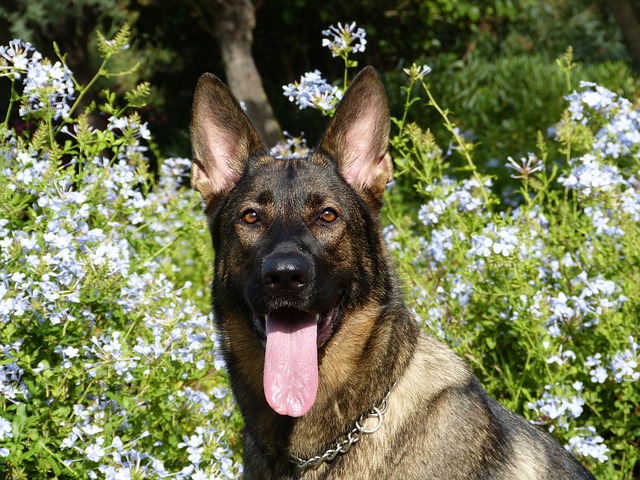There are dogs that seem to be able to ingest just about anything with little to no trouble; then there are those that require special diets, feeding methods and medications just to maintain basic digestive function.
Many dogs have “sensitive stomachs,” but the breeds on this list are predisposed to serious – sometimes life-threatening – gastrointestinal illnesses.
1. Irish Setter

Irish Setters are genetically predisposed to gluten-sensitive enteropathy (GSE) which causes diarrhea, weight loss and chronic skin problems if wheat or other grains are ingested. Due to their high risk of gluten intolerance, grain-free diets are typically recommended for this breed.
Gluten may also play a role in Irish Setters developing inflammatory bowel disease (IBD), which tends to be related to bacteria and/or food sensitivities. The symptoms are quite similar to those seen in GSE.
Unfortunately, Setters are prone to two potentially deadly digestive issues as well – megaesophagus and gastric torsion (bloat). Megaesophagus is a generalized enlargement of the muscular tube that delivers food to the stomach. Enlargement causes a decrease in motility, allowing food to get trapped in the esophagus, be regurgitated, or possibly become aspirated into the lungs and cause pneumonia.
Gastric Dilation Volvulus (GDV), also known as gastric torsion or bloat, occurs when an excessive amount of food, air or fluid accumulates in the stomach, causing it to swell and twist, trapping the gases and stomach contents inside. The problem is more common in “barrel-chested” breeds such as the Irish Setter. Without prompt veterinary care, canine bloat can quickly lead to death.
2. Labrador Retriever

Many Lab lovers refer to them as the “vacuum cleaners” of the canine world. If a dropped food item (or the occasional non-food item) is not quickly retrieved, a Labrador may just swoop in and nab it! This behavior has resulted in the breed becoming known for dietary indescretion and intestinal foreign bodies. In addition, labs are also prone to chronic food allergies and megaesophagus.
3. German Shepherd

Like labs, German Shepherds often develop food allergies and megaesophagus; and like Irish Setters, their barrel-chested body structure puts them at a higher risk for deadly bloat.
In addition, German Shepherds are predisposed to Eosinophillic gastroenteritis, an inflammatory condition of the stomach and intestines that can cause vomting, diarrhea, poor appetite and weight loss.
4. Shar-Pei

Chinese Shar-Peis are another breed prone to a host of digestive issues. A rare genetic defect that prevents the absorption of the essential nutrient Cobalamin (B12) is more common in these dogs. B12 cannot enter the bloodstream through the intestinal lining leading to poor appetite, stunted growth, protein loss, and low red and white blood cell counts.
In addition to this condition, Shar-Peis have one of the highest propensities for bloat of all medium-sized breeds. As if this weren’t enough, they are also at risk for inflammatory bowel disease (IBD), food allergies, megaesophagus, and Eosinophillic gastroenteritis!
5. Great Dane

As one of the largest, deep-chested dog breeds, Great Danes are at a very high risk for life-threatening bloat. The combination of genetic and environmental risk factors lead many Dane owners to pursue preventive gastropexy surgery for their dogs. This procedure involves attaching the stomach to the body wall to prevent it from twisting.
Great Danes are also predisposed to megaesophagus.
6. Miniature Schnauzer

These popular pooches are prone to a painful and potentially deadly condition called pancreatitis. Among other things, the pancreas excretes enzymes that aid in digestion. When the organ becomes inflamed as a result of disease, a high fat diet, exposure to certain drugs, trauma or disruption of the blood supply, the pet can become quite ill or even pass away.
According to the Universities Federation for Animal Welfare, Miniature Schnauzers are predisposed to ideopathic hyperlipidemia (high levels of fat in the blood) which likely accounts for their propensity for pancreatitis. Symptoms include severe abdominal pain, vomiting, diarrhea (with or without blood), lethargy and fever.
Hemorrhagic gastroenteritis (HGE) is another painful gastrointestinal condition often seen in this breed. The symptoms are similar to pancreatitis, but always include diarrhea with blood. The exact cause of HGE is unknown, but contributing factors can include severe stress, hyperactivity, dietary indescretion, allergies, parasites, bacteria and existing pancreatitis.
7. Yorkshire Terrier

Like Miniature Schnauzers, Yorkshire Terriers are predisposed to pancreatitis and hemorrhagic gastroenteritis (HGE). Due to their small size, Yorkies may be more susceptible to dehydration as a result of these illnesses and tend to require prompt veterinary attention.
Several additional breeds are prone to chronic gastritis which is the term used to describe long-term inflammation of the stomach with intermittent vomiting. Gastritis is most common in Lhasa Apsos, Shih-tzus, Miniature Poodles and Basenjis.
Project Paws® Organic Virgin Coconut Oil is safe for dogs and supports digestive system and immune system health. It contains fats are easy to digest and absorb, providing energy along with nutrients that benefit your dog! Every purchase from the iHeartDogs store provides 7 healthy meals for shelter dogs!
Featured Image via Flickr/Todd Ryburn

